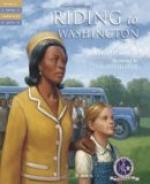“Nay, it’s ‘B.A.,’ and fowks wodn’t call a lass like Mary Taylor able-bodied; shoo’s no more strength in her nor a kitlin.”
“I reckon it’s nowt to do wi’ her body, isn’t ‘B.A.,’” interposed the Colonel. “Shoo’ll be one o’ yon college lasses, an’ they tell me they’re all foorced to put ‘B.A.’ at after their names.”
“What for?” asked the smith, who was always suspicious of information coming from the Colonel.
“Happen it’ll be so as you can tell ’em thro’ other fowks. It’ll be same as a farmer tar-marks his yowes wi’ t’ letters o’ his name.”
“Doesta mean that they tar-mark lasses like sheep?” asked William Throup, his mouth agape with wonder.
“Nay, blether-heead,” replied Stackhouse, “they’ll be like t’ specials, and have t’ letters on one o’ them armlets. But doesta reckon, Colonel, that B.A. stands for t’ name o’ t’ chap that owns t’ college?”
“Nay, they tell me that it stands for Bachelor of Arts, choose-what that means.”
The smith had listened to the Colonel’s explanation of the mysterious letters with growing scepticism. He had scarcely spoken, but an attentive observer could have divined his state of mind by the short, petulant blows he gave to the glowing horseshoe on the anvil. Now he stopped in his work, rested his arms on his hammer-shaft, and proceeded, after his fashion, to test the Colonel by questions.
“Doesta reckon, Colonel,” he began, “that t’ schooil-missus is a he-male or a she-male?”
“Her’s a she-male, o’ course. What maks thee axe that?”
The smith brushed the query aside as though it had been a cinder, and proceeded with his own cross-examination.
“An’ doesta think that far-learnt fowks i’ colleges can’t tell a he-male thro’ a she-male as well as thee?”
“O’ course they can. By t’ mass, Jerry, what arta drivin’ at?”
“An’ hasta niver bin i’ church, Colonel,” the smith continued, unperturbed, “when t’ parson has put spurrins up? Why, ’twere nobbut a week last Sunday sin he axed if onybody knew just cause or ’pediment why Tom Pounder sudn’t wed Anne Coates.”
“I mind it, sure enough,” interjected Stackhouse, “and fowks began to girn, for they knew there was ivery cause an’ ’pediment why he sud wed her.”
“Hod thy din! Besom-Joe, while I ve sattled wi’ t’ Colonel” said the smith, and he turned once more on his man. “What I want to know is if parson didn’t say: ‘I publish t’ banns o’ marriage between Tom Pounder, bachelor, and Anne Coates, spinster, both o’ this parish.’”
“Aye, that’s reight,” said the Colonel, “an’ I see what thou’s drivin’ at. Thou means Mary Taylor ought to be called spinster. Well, for sure, I niver thowt o’ that.”
“It’s not likely thou would; thou’s noan what I sud call a thinkin’ man. Thy tongue is ower fast for thy mind to keep up wi’ it.”
“Then what doesta reckon they letters stand for?” asked Besom-Joe.




